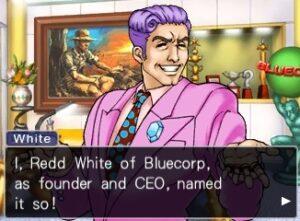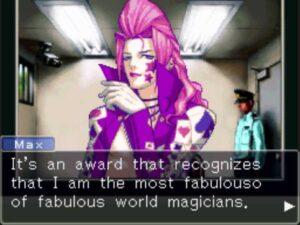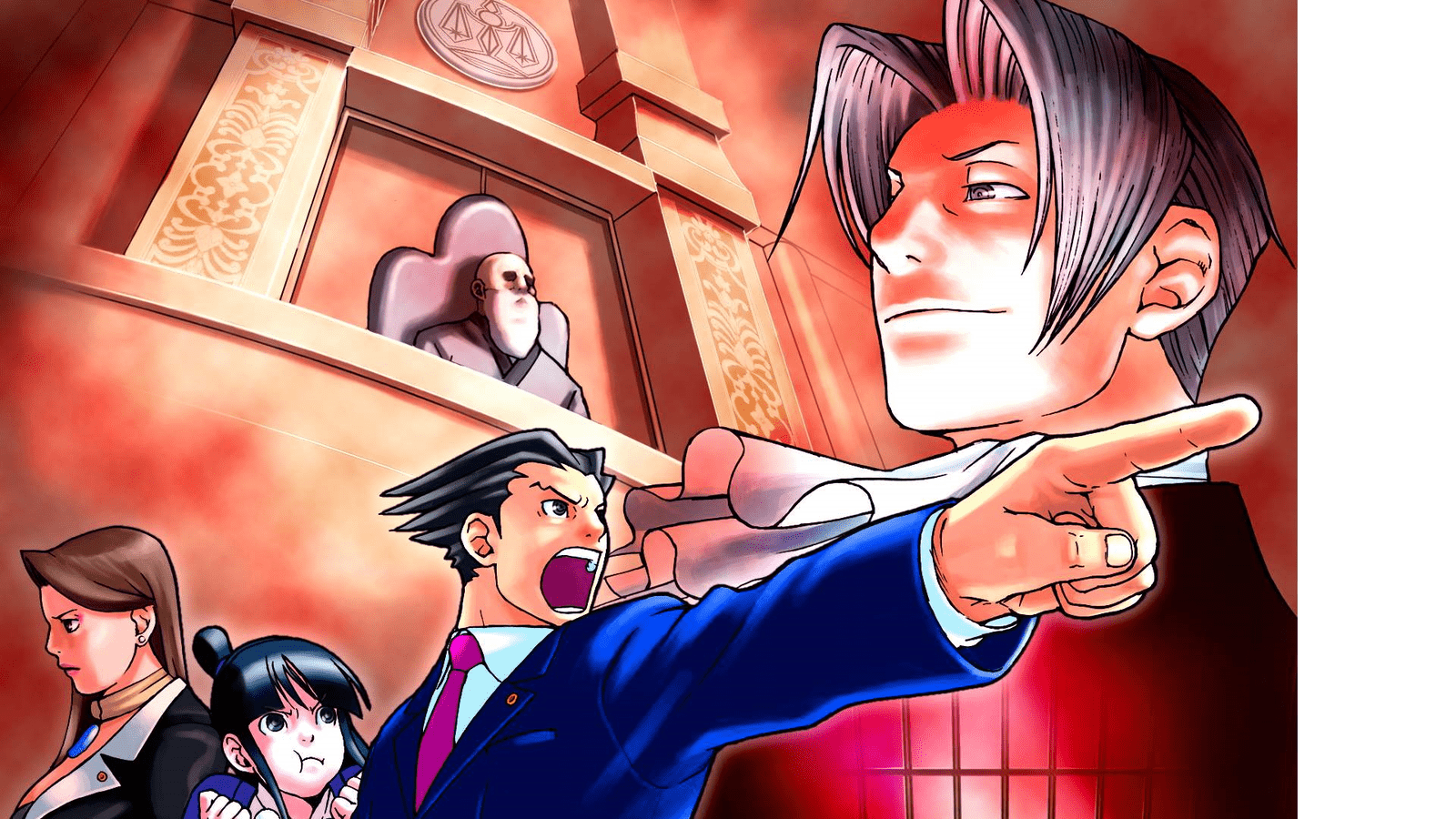When I first played Phoenix Wright: Ace Attorney on my 3DS in high school, I fell in love with it instantly, and the series has since become one of my favorites of all time. It likely speaks to the classic nature of Ace Attorney and its pervasiveness as a pop-cultural touchstone that I genuinely couldn’t tell you how I first learned about it— or even what made me ultimately decide to play it. I just remember that I couldn’t put it down once I started!
As a lover of the visual novel genre, Ace Attorney has always stood out to me for its ability to tell a 100% linear story about a predefined cast of characters (ie. Phoenix is Phoenix— you might decide which topics he brings up and when, but you have no control over what he says or thinks about those topics or what kind of person he is. There are even large chunks of his story you aren’t privy to and never get to be!) in a way that still gives me a sense of agency in driving that narrative forward, a feeling that Phoenix’s victories are my own. I struggle to pin down exactly what gives me that feeling, but I suspect it has something to do with the ludonarrative harmony of the game’s dialogue mechanics; despite the frequent mixing of straightforward dialogue sections with more “gamelike” mechanics like cross-examination and Justice for All‘s Magatama, the games rarely make me feel like I’m merely clicking through a story occasionally interrupted by minigames. Rather, I feel empowered through those mechanics to show my actual thinking while playing: identifying contradictions, pointing out which bits of dialogue give me pause, and being rewarded with the satisfaction of hearing Phoenix voice (usually, more-or-less) the same thoughts that led me to that conclusion. While I may lack control over the story’s direction, I do determine its pace— not only through my reading speed (as with any VN), but through my reasoning speed and understanding of the case. It rarely feels as though Phoenix is moving forward with information I don’t have access to or reasoning I didn’t first need to work through myself.




Ace Attorney also stands out for its memorable character writing and visual style. Ever since I first got into the series, the concept of an “Ace Attorney sprite” as a distinct genre of talksprite has become a touchstone for me. When thinking about character design, I often find it a fun exercise to consider what a character’s Ace Attorney sprite would look like: what poses they would strike, what their personality-encapsulating idle animation would be, how their progression from smug to nervous to desperate would look, and how they would break down in an over-the-top comical fashion that pushes some distinct character quirk to its wildest extreme. It’s no surprise that describing someone as an “Ace Attorney witness” has become shorthand in some circles for a person whose personality and presentation are fully committed to an often absurd theme— despite the series’ large cast, with 3 or more new characters regularly introduced with every trial, a great number of Ace Attorney characters (even background characters!) are nonetheless memorable because of how hard the series commits to making every design as distinct as possible, from name to silhouette to mannerisms to speech pattern. Although the Ace Attorney games push all of this to a degree that is near-impossible to take seriously, I think there is inspiration to be taken from this approach even in the context of more serious storytelling.



It’s wonderful to hear about your deep affection for Phoenix Wright: Ace Attorney and how it’s held a special place in your heart since high school. Your connection to the series highlights the enduring appeal of the games and their impact on fans.
Your insight into the series’ unique blend of visual novel storytelling and interactive mechanics is particularly intriguing. It seems that the way Ace Attorney merges dialogue with gameplay elements like cross-examination and the Magatama system enriches your engagement, allowing you to feel an integral part of Phoenix’s journey. The game crafts a narrative experience where, despite its linearity, you feel a significant sense of agency. This is a testament to the game’s design, which effectively intertwines story progression with player interaction, making each victory feel personally earned and satisfying.
The distinction you draw between having control over the pacing of the story, through both reading and reasoning, enhances this sense of participation. It’s an excellent point that, while Phoenix may be the character driving the action, it’s your deductions and understanding that propel the narrative forward, ensuring you are never just a passive observer but a participant making meaningful decisions that affect the outcome.
Additionally, your appreciation for the character writing and visual style in Ace Attorney adds another layer to its charm. The concept of an “Ace Attorney sprite” as a genre of talksprite is a fascinating way to look at character design. It shows how deeply the visual and stylistic elements of the game resonate with you and others in the community. Your description of these characters as being so vividly realized that they can be recognized by their distinct animations and expressions speaks volumes about the creativity and thoughtfulness behind their creation.
The way you describe using the character design from Ace Attorney as a template for thinking about other characters in various narratives is a brilliant reflection of the game’s influence on your perception of storytelling and character development. The idea that the exaggerated yet memorable character presentations in Ace Attorney could serve as inspiration even in more serious contexts is a profound takeaway.
Thank you for sharing such a thoughtful reflection on your experiences with Phoenix Wright: Ace Attorney. It’s clear the series not only provides entertainment but also sparks a deeper appreciation for narrative and game design.
As I’ve talked about with you in-person, it’s always great to hear about your thoughts on Ace Attorney given the significance and lasting impression it had on you. While culturally aware of it and having vaguely played through a bit in the past, it somehow hadn’t found its way into my memory of hallmark games. I think your points about the way the dialogue is implemented is standout and a particular element that VNs/storytelling experiences often wrestle with. It’s interesting because Phoenix is very much his own character, and in a way, it almost circles back to being comfortable “role-playing” as him, as the player. Lots of similar games attempt to maintain a level of plausible self-insert, which can actually be a detriment to immersion if the elements don’t come together. That “harmony” is key and Ace Attorney does it very well. Like you note, the reasoning and knowledge Phoenix works through is done in tandem with the player, and that creates a very smooth and satisfying experience.
Hi Jasmine! Reading about your enthusiasm for Ace Attorney made me fall in love with the game even more. I think games you play on your nintendo ds as a kid stick with you for life…
Since I only played through the first murder case, I learned a lot through your insights into the game mechanics and character designs. Despite playing briefly, I completely agree with how engaging the gameplay is — I never found myself mindlessly clicking through the dialogue, trying to get to the action, because the dialogue was the action! I really felt like I was standing in court, fighting a case out.
And the flamboyant character designs are one of my favorite parts of Ace Attorney. Even though I have only seen a handful, they all stand out to me and are unique in their own ways. I can’t wait more to see the even crazier character that pop up later on. Thanks for sharing your wonderful thoughts on this game 🙂
Hi Jasmine,
It was really nice reading this post from you about Ace Attorney. I was never able to pinpoint verbally how Ace Attorney’s narrative was so effective, but I think you captured many of its unique essences – especially how pacing can allow for victories and stories to feel like your own. The ability to reason and use evidence really drives the story and I think that the game is very rewarding when you are able to crack the case.
I was never too big on story based games, but I feel like Ace Attorney has really opened my eyes to the genre. Thank you for an amazing recommendation.
It really is wild just how kleenex’d the Ace Attorney art style is. It leans heavily into caricature and hyperbole, but without the weird grotesque style of say, a political cartoon. The game itself is a classic which has spawned a long, long franchise, and it is a bit disappointing that some of the charm has faded away. Aggressive stylistic decisions like that seem to only work out with smaller teams. The bigger the company the worse the return to mean.